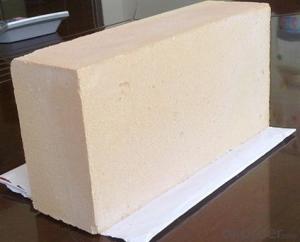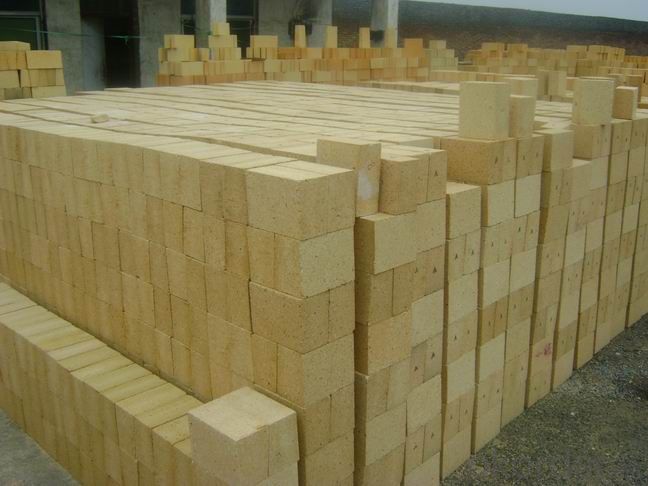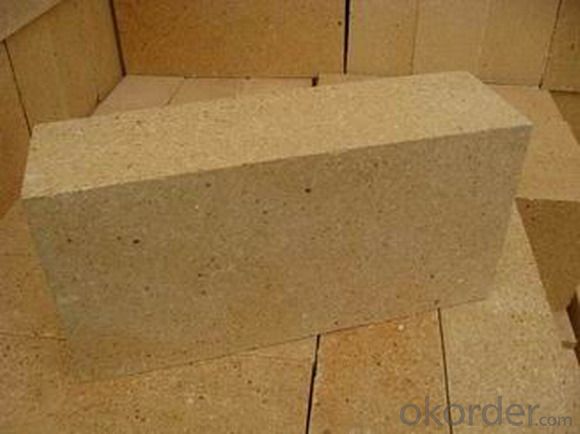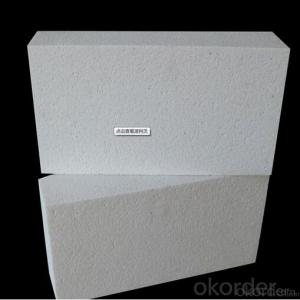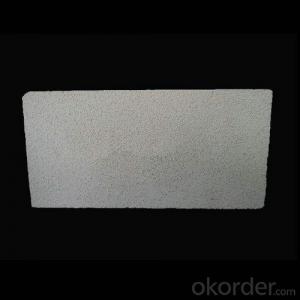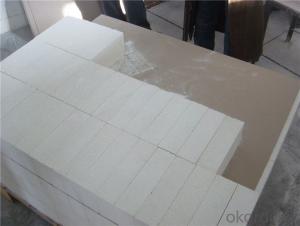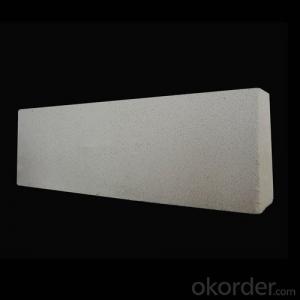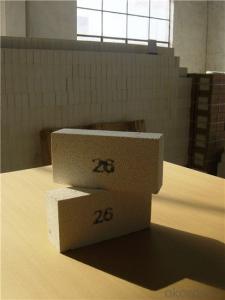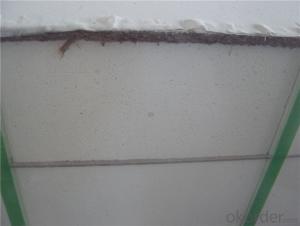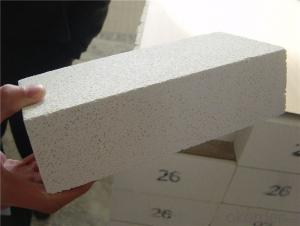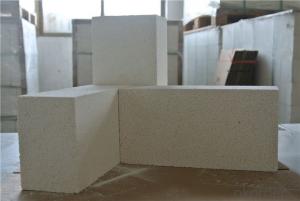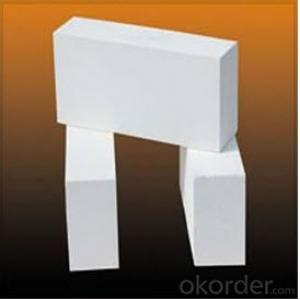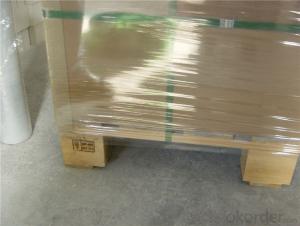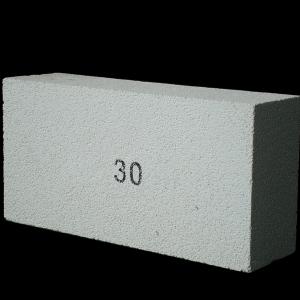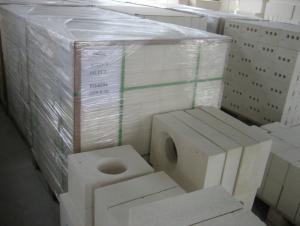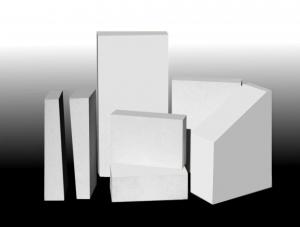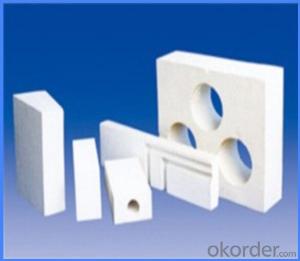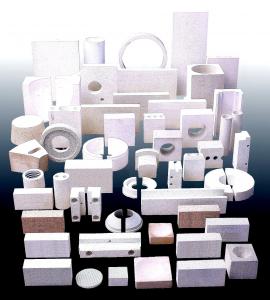Insulating Fire Brick - Manufacturer of Clay Brick Fire Clay Insulation Brick for Glass Furnace
- Loading Port:
- Tianjin
- Payment Terms:
- TT OR LC
- Min Order Qty:
- 20 m.t.
- Supply Capability:
- 10000 m.t./month
OKorder Service Pledge
OKorder Financial Service
You Might Also Like
CNBM conforms strictly to the requirements of ISO 9000 quality control system during the production. MSDS is also available if you want. The thermal insulation fire clay brick meet with the requirements of ASTM & JIS standards. So pls stay cool with our quality.
Insulating Fire Brick Technical index
Product No. | IFB70 | IFB60 | IFB50 | IFB40 |
Al2O3 | 68%-72% | 58%-62% | 48%-52% | 38%-40% |
Refractoriness (°C ) | ≥1790 | ≥1790 | ≥1790 | ≥1790 |
Bulk density (g/cm3) | 2.50-2.60 | 2.35-2.45 | 2.20-2.30 | 2.10-2.20 |
Apparent porosity (%) | 22 | 19-22 | 17-20 | 17-20 |
Cold Crushing strength (kg) | 480-510 | 450-480 | 430-450 | 390-430 |
Application
Insulating Fire Brick are used for the lining of converter, alternating current arc furnace, direct Current arc furnace and the ladle slag line, etc.
Equipment
1 unit of Ceramic Abrasive (SG Abrasive) pilot production line
2 units of Compact grain Abrasive pilot production lines
1 unit of high-end coated abrasives (abrasive cloth) production line
2 units of Boron Carbide production lines
3 large flexible crushing and sieving lines for grit production lines
2 units of 2000KVA furnaces for Boron Carbide fusion
6 units of 5000KVA-10000KVA dumping type electric arc furnaces for Brown Fused Alumina fusion
Company Advantage
(1)Long Insulating Fire Brick manufacture history: 25 years manufacturer
(2)Advanced equipment
(3)Diversification of production standards: ISO ANSI FEPA JIS ASTM
(4)Flexible payment: T/T L/C D/P D/A
(5)Professional marketing team and after-sale service
(6)Free sample
FAQs
Q1 |
What’s the transport method? |
A1 | FCL delivery goods with wooden pallet or wooden case by sea; If LCL delivery, must with wooden case; Sometimes need open top, flat rack or bulk cargo. |
Q2 |
What’s the required payment term? |
A2 | Generally 30% TT as the prepayment, 70% TT before delivery. If need, 100% Irrevocable Letter of Credit or negotiation. |
Q3 |
Which country are our products exported to? |
A3 | Apart from entire Chinese market, the US, Russia, Japan, Korea, Australia and some Southeast Asian Nations. |
- Q: Can insulating fire bricks be used in ceramic industry kilns?
- Yes, insulating fire bricks can be used in ceramic industry kilns. Insulating fire bricks are specifically designed to withstand high temperatures and are capable of providing insulation in kilns. They have low thermal conductivity, which helps to maintain consistent heat distribution within the kiln, resulting in more efficient firing processes. Additionally, insulating fire bricks are lightweight, making them easier to handle and install in kilns. Their ability to retain heat and resist thermal shock makes them an ideal choice for use in ceramic industry kilns.
- Q: What industries commonly use insulating fire bricks?
- Insulating fire bricks are commonly used in various industries where high temperature insulation is required. Some of the industries that commonly use insulating fire bricks include: 1. Steel industry: Insulating fire bricks are used to line the furnaces, kilns, and other high-temperature equipment in steel manufacturing plants. They provide excellent insulation, reducing heat loss and improving energy efficiency. 2. Glass industry: In glass manufacturing facilities, insulating fire bricks are used to line the furnaces and ovens where the glass is melted and molded. These bricks help maintain high temperatures while minimizing heat loss, ensuring efficient and consistent production. 3. Ceramic industry: Insulating fire bricks are used in ceramic kilns and pottery ovens, providing thermal insulation to maintain the desired temperature for clay and ceramic products. They help conserve energy and optimize firing processes. 4. Cement industry: Cement kilns require high-temperature insulation to efficiently produce cement. Insulating fire bricks are used to line the kilns, reducing heat loss and improving thermal efficiency. 5. Foundry industry: Insulating fire bricks are used in foundries to line the melting furnaces and ovens used for metal casting. They help retain heat, ensuring consistent and efficient melting of metals. 6. Power generation industry: Insulating fire bricks are used in boilers, furnaces, and incinerators in power plants. These bricks provide thermal insulation, preventing heat loss and improving the overall efficiency of power generation processes. 7. Petrochemical industry: In refineries and chemical processing plants, insulating fire bricks are used to line equipment such as reactors, furnaces, and ovens. They provide insulation to withstand high temperatures and harsh chemical environments. 8. Pharmaceutical industry: Insulating fire bricks are used in pharmaceutical manufacturing facilities to line the ovens and dryers used for various processes. These bricks ensure precise temperature control and energy efficiency. Overall, insulating fire bricks find applications in industries where high-temperature insulation is crucial for efficient and cost-effective operations.
- Q: Can insulating fire bricks be used in textile industry kilns?
- Insulating fire bricks are indeed applicable in the textile industry kilns. These bricks are specifically designed to endure extreme temperatures while providing exceptional insulation, rendering them appropriate for kiln usage. Within the textile industry, kilns are utilized for multiple procedures including fabric dyeing, drying, and curing. Implementing insulating fire bricks in these kilns guarantees the maintenance of a consistent and regulated temperature, resulting in efficient and uniform dispersion of heat. Furthermore, these fire bricks aid in minimizing heat loss, thereby leading to energy conservation and enhanced operational effectiveness. Hence, due to their thermal insulation properties and ability to endure high temperatures, insulating fire bricks are an ideal choice for textile industry kilns.
- Q: Do insulating fire bricks require any special anchors or supports for installation?
- Special anchors or supports are necessary for the installation of insulating fire bricks in certain applications. These bricks are lightweight and have low thermal conductivity, making them suitable for high-temperature environments like furnaces, kilns, and fireplaces. However, their lightweight nature can cause them to move or shift under certain conditions. To ensure the stability and integrity of the insulating fire bricks, it is important to use special anchors or supports during installation. These anchors or supports are typically made of metal, such as stainless steel, and are designed to securely hold the bricks in place. They prevent the bricks from shifting or falling out, especially when exposed to vibrations, thermal expansion/contraction, or other external forces. The specific type and design of the anchors or supports depend on the application and installation requirements. Common types include V anchors, U anchors, and L anchors, which can be embedded into the surrounding refractory material or attached to a structural frame. The anchors or supports should be spaced and installed correctly according to the manufacturer's guidelines to ensure sufficient support and stability of the insulating fire bricks. In conclusion, although insulating fire bricks offer excellent thermal insulation properties, they require special anchors or supports for installation to prevent movement or displacement. These anchors or supports are crucial for maintaining the structural integrity and longevity of the insulating fire brick system.
- Q: Are insulating fire bricks resistant to reducing atmospheres?
- Yes, insulating fire bricks are resistant to reducing atmospheres. These bricks are specifically designed to withstand high temperatures and harsh conditions, including exposure to reducing atmospheres. They are made from high-quality refractory materials that are capable of resisting the effects of reducing atmospheres, which can contain gases such as carbon monoxide or hydrogen. Insulating fire bricks have a low thermal conductivity and high insulating properties, making them ideal for applications where reducing atmospheres are present. They can effectively protect the surrounding areas from heat transfer and prevent damage to the structure. Additionally, these bricks have a high mechanical strength and excellent resistance to thermal shock, allowing them to maintain their integrity even in challenging conditions. In summary, insulating fire bricks are indeed resistant to reducing atmospheres due to their durable construction and ability to withstand high temperatures and harsh environments.
- Q: Are insulating fire bricks suitable for use in the construction of smelters?
- Insulating fire bricks are indeed appropriate for the construction of smelters. These bricks are specifically engineered to endure high temperatures and offer exceptional insulation qualities, thus rendering them a perfect choice for smelting purposes. Their thermal conductivity is low, enabling efficient heat retention and minimized energy wastage throughout the smelting procedure. Moreover, insulating fire bricks exhibit resistance to thermal shock, a vital feature in smelting operations characterized by abrupt temperature fluctuations. Thus, owing to their superior capacity to withstand heat and insulate, insulating fire bricks present a dependable option for smelter construction.
- Q: Are insulating fire bricks resistant to vermin infestation?
- Yes, insulating fire bricks are typically resistant to vermin infestation. These bricks are made from materials such as ceramic fibers, which do not provide a suitable environment for pests to inhabit or cause damage. Additionally, their dense composition and high-temperature resistance make it difficult for vermin to penetrate or chew through them.
- Q: Can insulating fire bricks be used in the construction of thermal insulation floors?
- Yes, insulating fire bricks can be used in the construction of thermal insulation floors. These bricks are designed to provide excellent thermal insulation properties, making them suitable for use in floor applications where insulation is required.
- Q: Can insulating fire bricks be used in lime plants?
- Yes, insulating fire bricks can be used in lime plants. They are commonly used in high-temperature applications, such as lime kilns, to provide thermal insulation and reduce heat loss. Insulating fire bricks help maintain consistent and efficient heat distribution, which is essential for the lime production process.
- Q: Are insulating fire bricks resistant to moisture absorption?
- Indeed, insulating fire bricks exhibit resistance to moisture absorption. These bricks have been meticulously engineered to possess a low porosity, thereby thwarting any moisture absorption. The manufacturing procedure entails the utilization of top-notch refractory materials that possess the capability to endure extreme temperatures, while simultaneously resisting the detrimental impact of moisture. Consequently, insulating fire bricks emerge as an exemplary option for scenarios necessitating moisture resistance, such as kilns, furnaces, and other environments characterized by elevated temperatures.
Send your message to us
Insulating Fire Brick - Manufacturer of Clay Brick Fire Clay Insulation Brick for Glass Furnace
- Loading Port:
- Tianjin
- Payment Terms:
- TT OR LC
- Min Order Qty:
- 20 m.t.
- Supply Capability:
- 10000 m.t./month
OKorder Service Pledge
OKorder Financial Service
Similar products
Hot products
Hot Searches
Related keywords
